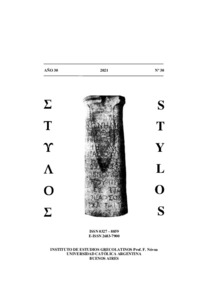Por favor, use este identificador para citar o enlazar este ítem:
https://repositorio.uca.edu.ar/handle/123456789/13387| Título: | Magisterio y poéticas espaciales en De Deo Socratis de Apuleyo | Autor: | Nenadic, Roxana | Palabras clave: | Apuleyo, ca. 125-ca. 180; GENERO LITERARIO; DIDACTICA; ESPACIO; ORATORIA | Fecha de publicación: | 2021 | Editorial: | Pontificia Universidad Católica Argentina. Facultad de Filosofía y Letras. Instituto de estudios grecolatinos "Prof. F. Nóvoa" | Cita: | Nenadic, R. Magisterio y poéticas espaciales en De Deo Socratis de Apuleyo [en línea]. Stylos. 2021, 30. doi: 10.46553/sty.30.30.2021.p44-55. Disponible en: https://repositorio.uca.edu.ar/handle/123456789/13387 | Resumen: | Resumen: De deo Socratis conforma, junto con De mundo y De Platone et eius dogmate, el corpus filosófico de Apuleyo de Madaura. Si bien las tres obras tienen en común el hecho de representar la contrapartida latina de textos griegos anteriores o coetáneos, De deo Socratis posee la particularidad de ser una conferencia. En su disertación, Apuleyo busca instalarse como discípulo y portavoz autorizado de su maestro Platón. Nos interesa observar los
medios por los cuales Apuleyo se identifica como discípulo de la familia pla-
tónica y, al mismo tiempo, procura destacarse como maestro de los conteni-
dos a exponer. En uno de los segmentos finales, luego de la demostración de
la existencia de los daemones y de las disquisiciones en torno de sus caracte-
rísticas y clasificación, Apuleyo se refiere a la cuestión que da nombre a su
conferencia: la relación entre Sócrates y su daemon personal (§157-167).
Nos proponemos detenernos en la serie de exempla homéricos que ilustran el binomio “adivinación / sabiduría” (§158-162). Bajo las hipótesis de que la adscripción genérica del hipotexto homérico era conocida por el auditorio, y de que cada género tiene su modo peculiar de representar el espacio donde se desarrolla la acción, intentaremos resaltar los efectos de sentido que aportan a las explicaciones de Apuleyo los espacios allí evocados. Abstract: De deo Socratis, together with De mundo and De Platone et eius dogmate, forms the philosophical corpus of Apuleius of Madaura. Although the three works have in common the fact that they represent the Latin counterpart of earlier or contemporary Greek texts, De deo Socratis has the singularity of being a lecture. In his dissertation, Apuleius seeks to establish himself as a disciple and authorized spokesperson of his teacher Plato. We aim to observe the means by which Apuleius identifies himself as a disciple of the Platonic family and, at the same time, tries to stand out as a teacher of the contents to be explained. In one of the final segments, after the demonstration of the existence of the daemons and the disquisitions about their characteristics and classification, Apuleius refers to the question that gives his lecture its name: the relationship between Socrates and his personal daemon (§157-167). We intend to examine the series of Homeric exempla that illustrate the binomial "divination / wisdom" (§158-162). With the hypothesis that the generic ascription of the Homeric hypotext was known to the audi- ence, and that each genre has its own peculiar way of representing the space where the action takes place, we’ll try to highlight how the evoked spaces contribute to Apuleius' explanations. |
URI: | https://repositorio.uca.edu.ar/handle/123456789/13387 | ISSN: | 0327-8859 (impreso) 2683-7900 (online) |
Disciplina: | LITERATURA | DOI: | 10.46553/sty.30.30.2021.p44-55 | Derechos: | Acceso abierto | Fuente: | Stylos. 2021, 30 |
| Aparece en las colecciones: | STY - 2021 nro. 30 |
Ficheros en este ítem:
| Fichero | Descripción | Tamaño | Formato | |
|---|---|---|---|---|
| magisterio-poéticas-espaciales-Socratis.pdf | 274,46 kB | Adobe PDF |  Visualizar/Abrir | |
| stylos30_portada.pdf | 128,89 kB | Adobe PDF |  Visualizar/Abrir |
Visualizaciones de página(s)
41
comprobado en 27-abr-2024
Descarga(s)
91
comprobado en 27-abr-2024
Google ScholarTM
Ver en Google Scholar
Altmetric
Altmetric
Este ítem está sujeto a una Licencia Creative Commons

